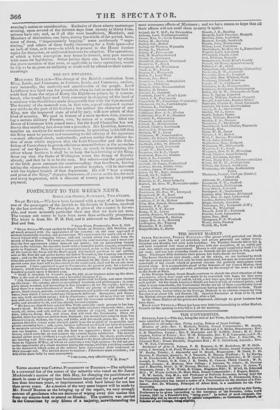THE DUC D'ETAMPES.
MORNING HERALD—The change of the British constitution from King, Lords, and Commons, to Cabinet, Lords, and Commons, excites, very naturally, the curiosity and apprehension of the people. Lord Lyndhurst was hard run for precedents when he had to take the best he could find from the reign of Harry the Eighth—a prince, be it remembered, who would have used little ceremony in chopping off the head of a minister who should have made disagreeably free with the sign.manual. The ferocity of the monarch was, in that case, a good safeguard against any tricks on the part of his Cabinet ; but neither the character of our King, nor the improved state of trial by jury, will now admit of that kind of security. We read in history of a more modern date, concerning a certain military Premier, who, by means of a stamp, filled the House of Commons with armed men ; but the Lord Chancellor has not drawn that startling fact down into a precedent. His thrdship, however, supplies an anodyne for tender consciences, by providing in his bill that the King must be present and consenting to the affixingof his signature —a most effectual check, undoubtedly, and not unlike that delicate fiction of state which supposes that the Lord Chancellor and the Archbishop of Canterbury in person officiate as men-midwives at the accouchement of our Queens. Surmise is busy, as usual, in determining the officer whose business it shall be to keep the handwriting of the King. Some say that the Duke of Wellington wears the Stamp of Royalty already, and that he is to be the man. But others—and the gentlemen of the Irish press amongst the number—allege that Goulburn, having taking the stamp-duty into his own peculiar keeping, will be intrusted with the highest branch of that department. Ile will " bear a stamp and print of the King," charging fourpence, of course, as his fee, for each and every impression, with a discount of twenty per cent. fur prompt payment.


























 Previous page
Previous page